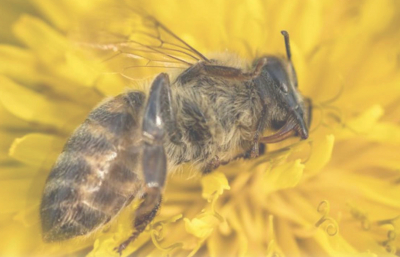


The project, ‘Neonicotinoids and their Impact on Ecosystem Services for Agriculture and Biodiversity in Africa’ aims to assess the potential risk of neonicotinoid insecticides – the subject of a widespread ban in the EU – in the African context, where economies and societies that are greatly dependent on agriculture for survival.
Since their commercialization in the 1990s, neonicotinoids have become the most widely used kind of insecticide and are registered in more than 120 countries. They are the primary agent used on insecticide-treated seeds. Neonicotinoids, which act by blocking neural pathways, are systemic. That is, they pass into and spread throughout the plant tissue causing a plant to become toxic to insects consuming any part of it – including pollen and nectar, as well as plant residues. This means that non-target species, such as pollinators and predators, are also exposed. When applied as dressings on plant seeds, significant parts of the active ingredient enter the soil and aquatic systems, broadening the potential exposure to non-target (including non-insect) species. This has knock-on effects on ecosystem services such as natural pest control carried out by predators and parasitoids. Indeed, research has identified many potential effects on honeybees and other pollinators (e.g. bumble bees, solitary bees, flies, beetles and butterflies). Concern over the effects on individual species has also been associated with findings of substantial declines in insect populations overall, which could bring about a global pollination crisis.
The project kick-off workshop, hosted by the Academy of Science of South Africa (ASSAf) and the German National Academy of Sciences, Leopoldina, took place in Pretoria on 14-16 November 2018.
Opening the workshop, project director Mike Norton reviewed the findings and recommendations of the EASAC report, ‘Ecosystem services, agriculture and neonicotinoids’, released in 2015, which has been influential in discussions that have led to an extension of the ban on certain neonicotinoid compounds in the EU enacted by the European Commission in April 2018.
Other keynote speakers included Jean-Marc Bonmatin, French National Centre for Scientific Research (CNRS), who presented the ‘Scientific findings of the IUCN literature reviews of the effects of systemic pesticides’; Francesco Pennacchio, University of Napoli Federico II (Italy), who presented results of his own and other research on ‘Immunity, stress and sub-lethal effects of neonicotinoids in insects’; and Maarten Biljeveld van Lexmond (IUCN), who reviewed ‘Regulatory responses to neonicotinoids around the world’.
To date, such regulatory responses are mostly enacted in high-income countries, although Beth Heitzmann (International Association of Butterfly Exhibitors and Suppliers, and member of the IUCN Task Force on Systemic Pesticides), presented information from the Philippines where the governor of Marinduque island – the ‘Butterfly Capital of the Philippines’ – has taken action to exclude the use of neonicotinoids across the whole island.
The core part of the Pretoria workshop, however, was an information-sharing session on the status of neonicotinoid registration and use across Africa by some of the 30 expert representatives brought together from some 12 African countries. The situation in 10 African countries was presented:
Benin – by Abdou Paraiso, University of Parakou
Botswana – by Motshwari Obopile, Botswana University of Agriculture and Natural Resources
Cameroon – by Leonard Ngamo Tinkeu, University of Ngaoundéré
Cote d’Ivoire – by Akpa Akpesse, University Félix Houphouët-Boigny
Egypt – by Youssef Dewer, Central Agricultural Pesticide Laboratory
Kenya – by Saliou Niassey, International Centre for Insect Physiology and Ecology
South Africa – by Christian Pirk, University of Pretoria
Sudan – by Nabil Hamed Hassan Bashir, University of Gezira wad medani
Tanzania – by Mkabwa Katambo, University of Dar es Salaam
Uganda – by Patrice Kasangaki, National Agriculture Research Organization.
From these presentations, as series of knowledge and implementation gaps and needs were identified that formed the basis of discussions on the second day of the meeting and that will guide the implementation of the project.
The next step is to begin to consolidate the knowledge of the situation of neonicotinoid use across Africa, including by bringing in additional experts, especially those from countries not represented at the workshop as well as those to be nominated by member academies of NASAC.
Funding for the project, which is expected to take about a year to complete, is being provided by the German Federal Ministry of Education and Research (BMBF).
A press release announcing the workshop is available on the ASSAf website: Press release